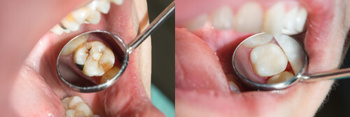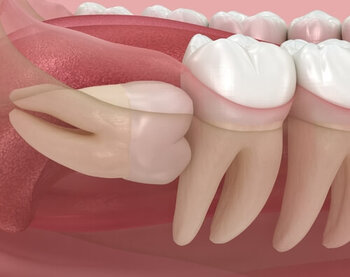If you’re feeling soreness at the back of your mouth, you’re not alone. Wisdom tooth growing pain is something many people experience, especially in their late teens to mid-twenties, when these third molars typically emerge. But how long does wisdom tooth growing pain last, and what can you do to ease it?
In this blog, we’ll explore what causes this unique type of discomfort, how long you can expect it to linger, and the best ways to find relief while ensuring your oral health stays on track. If you’re experiencing intense or prolonged pain, it’s best to consult an emergency dentist in Brisbane for prompt care.
What Are Wisdom Teeth, and Why Do They Hurt When They Grow?

Wisdom teeth are the last set of molars to come in, usually making their debut between the ages of 17 and 25. As the final chapter of adult teeth development, their arrival is often far from subtle. The sensation is commonly referred to as wisdom tooth growing pain, which can range from mild discomfort to severe pain.
Why Does Wisdom Tooth Growth Cause Pain?
Wisdom tooth pain occurs for a few main reasons:
- Lack of space: Your jaw might not have enough room for these new teeth, causing them to push against neighboring teeth or grow in at odd angles.
- Gum inflammation: As the teeth break through the gums, swelling and tenderness in the gum tissue and surrounding tissues are common.
- Impacted teeth: Sometimes the wisdom teeth don’t fully emerge and become impacted, increasing the chance of infection and intense pain.
So, How Long Does Wisdom Tooth Growing Pain Last?
This depends on a few factors like your age, the position of your wisdom teeth, whether they’re impacted, and your individual pain tolerance.
General Duration of Wisdom Tooth Pain
- Initial eruption: Mild discomfort can last a few days to a week as the wisdom teeth start pushing through the gums.
- Ongoing growth: If the tooth is still shifting into place, you might experience on-and-off tooth-growing pain over a few weeks or even months.
- Impacted or misaligned teeth: In cases of impacted wisdom teeth, the pain may persist until wisdom teeth removal is done.
When Does It Usually Stop?
If your wisdom teeth erupt normally and settle into a proper position, the pain typically subsides within a few days to a couple of weeks. However, if the wisdom tooth pain varies in intensity or doesn’t go away, it may be a sign of an issue that requires dental attention. To learn more about potential complications and treatment options, visit this page for detailed information on managing wisdom tooth pain effectively.
What Does Wisdom Tooth Pain Feel Like?
Wisdom tooth growth pain can be:
- A dull ache in the jaw
- Pressure or tightness at the back of your mouth
- Sore or swollen gums around the tooth
- Occasional throbbing
- Pain radiating to the ear or head (sometimes leading to persistent headaches)
In many cases, wisdom tooth pain is bearable, but if the discomfort worsens or leads to other issues, don’t ignore it.
What If the Pain Persists or Becomes Severe?
Persistent or severe pain isn’t something you should push through. Pain that doesn’t go away could indicate:
- A gum infection (like pericoronitis)
- Tooth decay in partially erupted wisdom teeth
- Cysts or damage to nearby teeth
- Gum disease around the growing tooth
When wisdom teeth hurt continuously or severely, it’s best to visit your dentist or oral surgeon to determine if wisdom teeth extraction is the right step.
How to Alleviate Discomfort While Your Wisdom Teeth Grow
Even if you’re not ready or required to remove your wisdom teeth, there are ways to manage the discomfort and reduce inflammation.
Home Remedies That Provide Temporary Relief
- Ice pack: Apply an ice pack wrapped in a towel to your cheek for 15–20 minutes to reduce swelling and dull the pain.
- Saltwater rinse: A warm saltwater rinse helps clean the affected area, soothe sore gums, and minimise bacteria.
- Soft foods: Eating soft foods like yogurt, mashed potatoes, or smoothies reduces pressure on sore teeth.
- Over-the-counter medications: Pain relievers such as ibuprofen can provide temporary relief and reduce inflammation.
Maintain Good Oral Hygiene
Practicing proper oral hygiene is essential, especially when wisdom teeth are coming in. Gently brushing and flossing can help prevent gum infection or tooth decay around the new teeth.
Should You Have Your Wisdom Teeth Removed?

Not everyone needs their wisdom teeth removed. But if the teeth are:
- Impacted or growing sideways
- Causing persistent pain
- Leading to crowding or damage to other teeth
- Contributing to gum disease or infections
Then, wisdom teeth extraction might be the healthiest long-term solution.
Your dentist will assess their position using X-rays and decide whether to monitor the teeth or refer you to an oral surgeon for removal.
What Happens After Wisdom Tooth Extraction?
If removal is necessary, the healing process usually takes a few days to a week. Pain and swelling can be managed with rest, ice packs, soft foods, and pain relief medications. Following post-operative instructions is essential to promote healing and avoid complications like dry socket.
When to Call a Dentist
You should schedule a dental appointment if:
- The pain persists for more than two weeks
- You notice pus, swelling, or a bad taste
- You have a fever or difficulty opening your mouth
- You experience more serious complications, like difficulty swallowing or breathing
Early intervention can help avoid bigger problems and ensure a healthy smile.
FAQs About Wisdom Tooth Growing Pain
Is wisdom tooth pain bearable?
In many cases, yes. But if it becomes severe or persistent, it may require professional dental care.
Do all wisdom teeth cause pain when growing?
Not always. Some people experience minimal or no pain during wisdom tooth eruption, especially if the teeth grow in straight.
What helps relieve wisdom tooth pain fast?
Cold compresses, saltwater rinses, OTC medications, and eating soft foods can all help alleviate discomfort quickly.
When should I consider wisdom teeth removal?
If the teeth are impacted, causing crowding, recurring infections, or persistent pain, removal might be the best option.
Final Thoughts: Managing Wisdom Tooth Growing Pain with Confidence

So, how long does the pain from a wisdom tooth’s growth last? In most cases, the discomfort lasts for a few days to a couple of weeks as the tooth erupts. But the duration of wisdom tooth pain can vary depending on how the teeth are growing, whether they’re impacted, and your body’s response.
Whether you’re feeling a dull ache or facing severe pain, knowing the signs and appropriate treatment options can make all the difference. Keep an eye on your symptoms, maintain good oral hygiene, and reach out for professional dental care when needed.
Wisdom teeth are just one part of your dental development, and with the right care, you can get through this stage smoothly and comfortably.
References:
https://www.medicalnewstoday.com/articles/319461
https://my.clevelandclinic.org/health/diseases/24142-pericoronitis
https://www.colgate.com/en-us/oral-health/wisdom-teeth/what-is-the-recovery-time-after-wisdom-teeth-removal
https://www.mayoclinic.org/diseases-conditions/wisdom-teeth/symptoms-causes/syc-20373808

